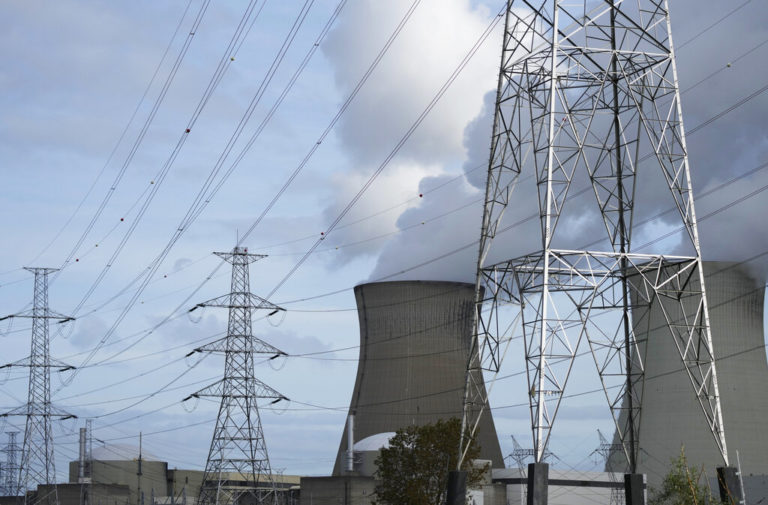

Peggy Livanios, is the President of U.S. Energy Stream, an American oil and gas advisory firm. She is a young female entrepreneur, and a certified mechanical engineer. She promotes U.S. LNG exports, crude oil exports, and American energy investments in Europe and Eastern Mediterranean. Moreover, she plays a leading role in the promotion of the strategic alliance between the United States, Israel, Greece, and Cyprus.
Peggy speaks to Nikos Kosmopoulos and to the Indicator.gr. She shares her views on the energy and geopolitical developments in the Eastern Mediterranean, and the role of the strategic alliance between the United States, Israel, Greece, and Cyprus. She states that in order to mitigate the risk of Turkey, Greece needs to strengthen its alliance with the United States and Israel. Peggy answers our questions about the importance of the alliance between the United States, Israel, Greece, and Cyprus. She believes that it constitutes a strategic alliance as far as energy and defense are concerned, and that it fosters the American and European energy investments in oil and gas exploration and production.
More specifically, when asked whether Greece could play a central role in the energy matters of the Eastern Mediterranean and Eastern Europe, Peggy pointed out that Greece has the potential of playing that essential role due to its geo-strategic position and through its Revithoussa Liquefied Natural Gas (LNG) Terminal can help Europe diversify its gas supplies and strengthen its energy security.
Below you can read the whole interview:
Could you tell us a bit more about U.S. Energy Stream? When did it start? What is your mission and your future goals?
Mr Kosmopoulos, thank you so much for inviting me to Indicator.gr today.
U.S. Energy Stream is a private American oil and gas advisory firm operating in the United States and Europe. With offices in Washington, DC, Houston, Texas and Frankfurt, Germany our mission is to foster American investments in the field of energy and especially oil and natural gas.
How would you describe your firm’s strategy with respect to the processes that are currently taking place in the Eastern Mediterranean?
The Eastern Mediterranean has emerged as a region of high interest in the field of energy over the last years.
Our firm, with its highly experienced staff in the energy and geopolitical matters of the United States, Europe and Eurasia, promotes American and European investments in the region.
According to the media, Turkey is planning on carrying out research within the Greek continental shelf. Are you expecting a “heated” incident and, in such an event, do you think that our allies would support us?
On July 15th, the European Council imposed sanctions on Turkey for its recent and continuous illegal drilling activities in the Eastern Mediterranean. This results from the gradual deterioration in the relations between the European Union and Turkey.
The relations between Turkey and the United States are strained mainly due to Turkey’s reception of the Russian anti-aircraft system S-400, despite the repeated warnings of Washington, DC. As a consequence, the United States ejected Turkey from the F-35 program and is likely to impose further sanctions on Turkey in the future.
At the same time, for the first time, a strategic alliance between the United States, Israel, Greece and Cyprus is being fostered by Washington in the fields of energy and defense, whereas Turkey is dealt with suspicion due to its close cooperation with Russia.

Greece is in a very difficult position, being financially exhausted by the great economic crisis of the last 10 years. The new Prime Minister of Greece, Kyriakos Mitsotakis, and the new government should reinforce the country’s alliance with the United States and Israel, in order to abate the danger posed by Turkey. The future of the strategic American-Israeli-Greek-Cypriot alliance in the energy field is crucial for the national security of Greece.
What’s your opinion on the fourfold alliance between Greece, Cyprus, Israel and the United States that has been recently formed?
The strategic alliance between the United States, Israel, Greece and Cyprus in the fields of energy and defense fosters American and European investments in exploration and production and strengthens their national security. However, there are some great geopolitical risks for energy investments in the Eastern Mediterranean, resulting from the escalation of Turkey’s incitement on the one hand and the monopolistic energy strategy of Russia in Eastern and Central Europe, on the other hand.
In the area of the Cypriot Exclusive Economic Zone (EEZ), where oil majors representing countries – great powers like Exxon Mobil operate, there seems to be no problem in the energy and drilling activities caused by exogenous factors. Do you think that those oil majors could ensure Cyprus’s energy security?
Cyprus’s energy and national security are empowered and reinforced by American companies’ investments and especially investments by oil majors like Exxon Mobil.
Attracting American energy investments is the most secure way of ensuring energy security and geopolitical stability.
Could Greece play a central role in the energy matters of the Eastern Mediterranean?
Greece has the potential of playing an essential role in the energy matters of the Eastern Mediterranean due to its geo-strategic position and its current infrastructure. With the Revithoussa Liquefied Natural Gas (LNG) Terminal, which is operated by DESFA S.A. and constitutes one of its most significant domestic infrastructures, Greece is able to import liquefied natural gas thus reinforcing the country’s energy security. Furthermore, through that terminal and the natural gas transportation network, Balkan countries have the opportunity to diversify their natural gas supplies, thus reinforcing energy security in Eastern Europe.

These days we are talking about the U.S. Energy Renaissance and the shale gas revolution due to the new technology that has changed everything. We are implementing the new technology of horizontal drilling and fracking, father of which is George Mitchell, an American of Greek descent from Texas. This great innovation gives us the ability to exploit natural gas deposits that were previously impossible to exploit.
Using this technology, the U.S. has a natural gas surplus which, in its liquefied form, is transported via LNG ship. Greece, via the Revithoussa LNG Terminal, can receive American liquefied natural gas and fuel the Balkans that still depend on the monopolistic energy strategy of Russia.
Furthermore, the Southern Gas Corridor through the Trans Adriatic Pipeline (TAP) has rendered Greece the first European country that has ever received Azeri natural gas.
In your opinion, what are the steps that need to be taken in order for Greece to achieve sustainable development and further investments?
The reinforcement of the energy and bi-lateral relations between Greece and the United States in any manner possible is the only way of ensuring sustainable development and investments in Greece.
The current financial and geopolitical situation are fostering the strengthening of the Greek-American relations now more than ever before. The solution for the economic development and energy security of Greece can be attained primarily through the strengthening of the Greek-American relations.
Greece should follow Israel’s example and aim for a stronger relationship with the United States.
Is the U.S. interested in investing in our country?
The U.S. is highly interested in investing in Greece. This stems both from Washington and the American political leadership and from the investment and business fields. Operating between Washington and Houston and holding meetings with high-ranking government and business leaders in the United States, I am in constant discussions regarding the promotion of American energy investments in Greece.
Many young people have migrated to foreign countries because of the Greek economic crisis in the hope of a better future. In your opinion, what are the most appropriate ways to counter this Brain Drain?
The best way is to create a free market, lower taxes, limited government, and transparency. Attracting American and European investments can be achieved mainly under those prerequisites. These investments will create new jobs, economic growth and the conditions for a better quality of life that will give young people a better and brighter future.

Σχετικά Νέα
 Ιράν-ΗΠΑ: Σοβαρές και ενθαρρυντικές οι συνομιλίες για το πρόγραμμα πυρηνικής ενέργειας στο Ομάν
Ιράν-ΗΠΑ: Σοβαρές και ενθαρρυντικές οι συνομιλίες για το πρόγραμμα πυρηνικής ενέργειας στο ΟμάνΟι ΗΠΑ και το Ιράν ολοκλήρωσαν χθες Κυριακή στη Μούσκατ τον τέταρτο κύκλο διαπραγματεύσεων.
 Τουλάχιστον 21 νεκροί σε τροχαίο στη Σρι Λάνκα
Τουλάχιστον 21 νεκροί σε τροχαίο στη Σρι ΛάνκαΤουλάχιστον 21 επιβάτες λεωφορείου που μετέφερε βουδιστές προσκυνητές έχασαν τη ζωή τους και άλλοι.
 Συμφωνία Βιετνάμ-Ρωσίας για την κατασκευή πυρηνικών σταθμών ενέργειας
Συμφωνία Βιετνάμ-Ρωσίας για την κατασκευή πυρηνικών σταθμών ενέργειαςΤο Βιετνάμ και η Ρωσία συμφώνησαν να προχωρήσουν σε γρήγορες διαπραγματεύσεις και να υπογράψουν.

